
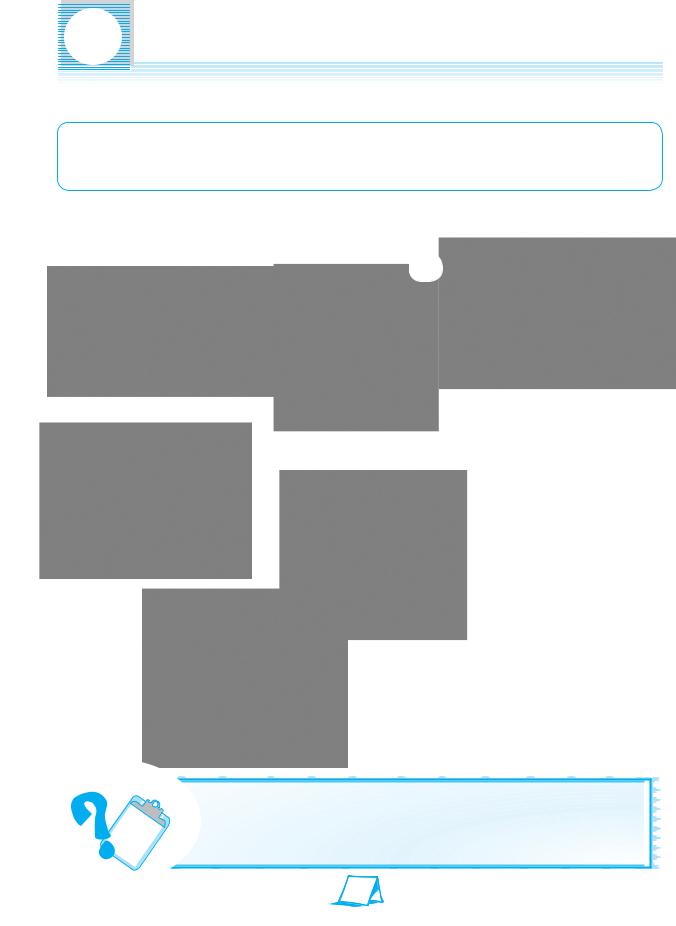

 12 Interjections
12 Interjections
An interjection is a word that expresses a sudden, strong feeling such as surprise, pain, or pleasure.
Cheers! |
Oh dear! |
Happy |
|
Birthday! |
|
|
|
Look out!
|
y o u |
|
|
d |
k |
n |
o |
i |
|
|
|
D |
|
|
|
|
|
w |
|
|
|
|
?
|
Wow! |
|
Ouch! |
Goodness! |
|
Oh! |
||
Ssh! |
Good! |
|
|
||
|
Oh no! |
|
|
Hooray! |
|
|
Thanks! |
|
|
Help! |
|
|
Good luck! |
|
|
Well done! |
|
|
Gosh! |
|
|
Hey! |
|
|
Merry Christmas! |
|
|
Happy New Year! |
|
|
|
|
|
||
Notice that an exclamation point (!) is often |
|
|
used after interjections. |
|
|
|
|
|
138
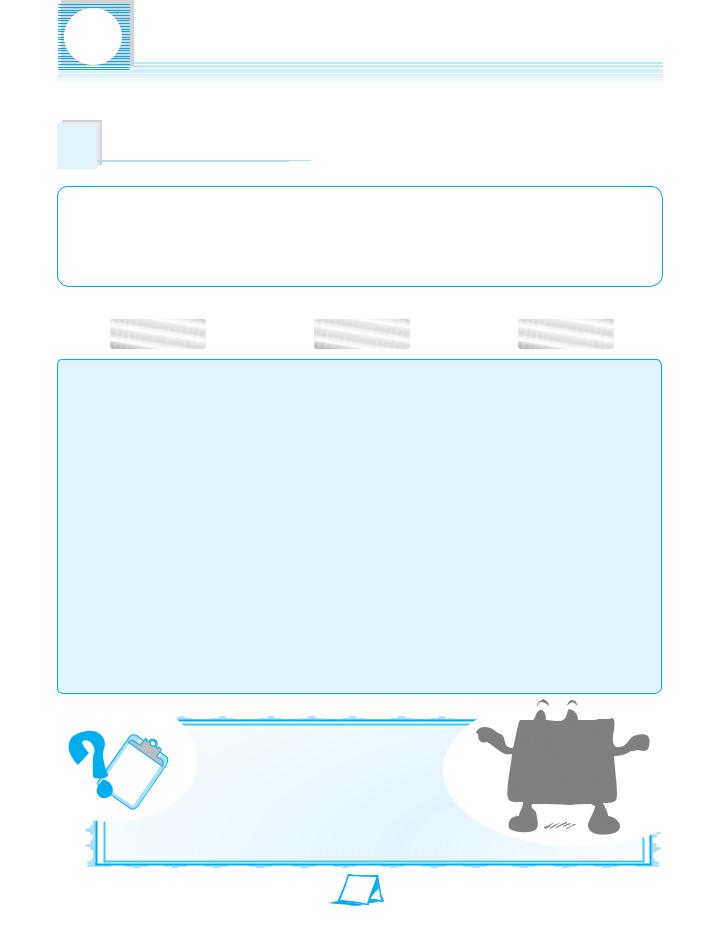

 13 Sentences
13 Sentences
What is a Sentence?
A sentence is a group of words that expresses a complete thought. A sentence must have a subject and a verb, but it may or may not have an object.
Subject |
|
Verb |
|
Object |
Sally |
|
is making |
|
a doll. |
|
|
|||
Wendy and Kim |
|
are fighting. |
|
|
The hedgehog |
|
curled up. |
|
|
Maggie |
|
is reading |
|
a book. |
It |
|
is raining. |
|
|
Dad |
|
cooked |
|
dinner. |
I |
|
am flying |
|
a kite. |
We |
|
are eating |
|
our breakfast. |
They |
|
are washing |
|
the dishes. |
The dentist |
|
is examining |
|
Susan’s teeth. |
The old couple |
|
have |
|
no children. |
Janet |
|
screamed. |
|
|
|
|
|
|
|
d i D
y
o
u
k
n
o  w
w
?
A sentence that makes a statement begins with a capital letter and ends with a period.
|
|
|
|
|
|
|
|
|
|
|
|
|
|
Sentence |
|
|
|
|
|||
capital |
|
period |
||||||||
|
|
|
|
|
|
|
|
|
||
letter |
|
subject |
verb |
|
|
|
||||
|
|
|||||||||
|
|
|
|
|
|
|
|
|
|
|
139
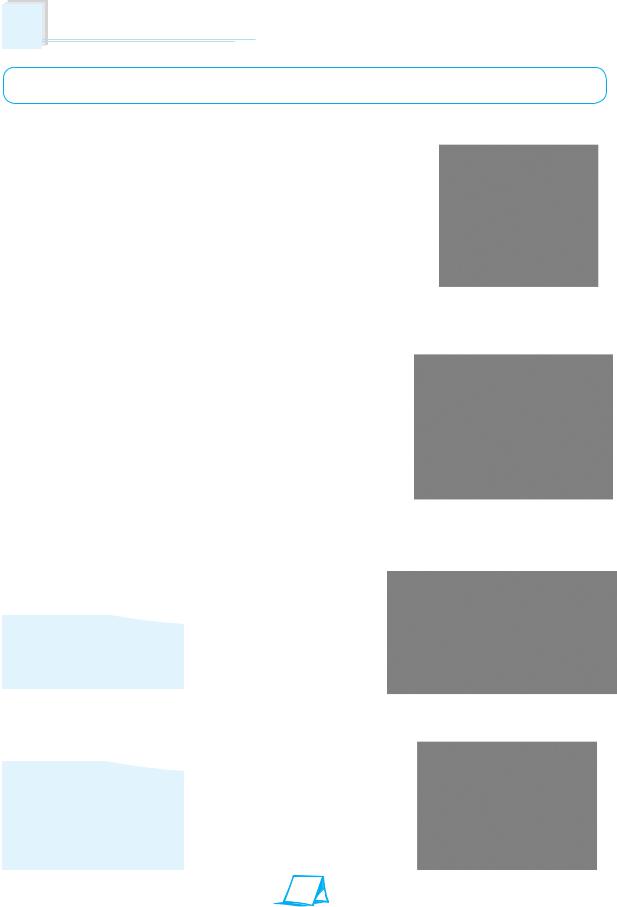
Kinds of Sentences
There are four kinds of sentences.
4A declarative sentence makes a statement.
The children are swimming. |
Richard is feeding |
|
The telephone rang. |
||
the hens. |
||
Everyone sat down. |
|
|
|
|
4 An interrogative sentence asks a question.
Where are the twins? |
What is Richard |
Are you going shopping today? |
doing? |
What is your name? |
|
|
|
4An exclamatory sentence expresses strong emotion.
What lovely weather!
The silly girl!
How stupid I am!
4An imperative sentence gives an order.
Please sit down.
Tell me the truth. |
Come back! |
|
|
Speak up! |
|
140
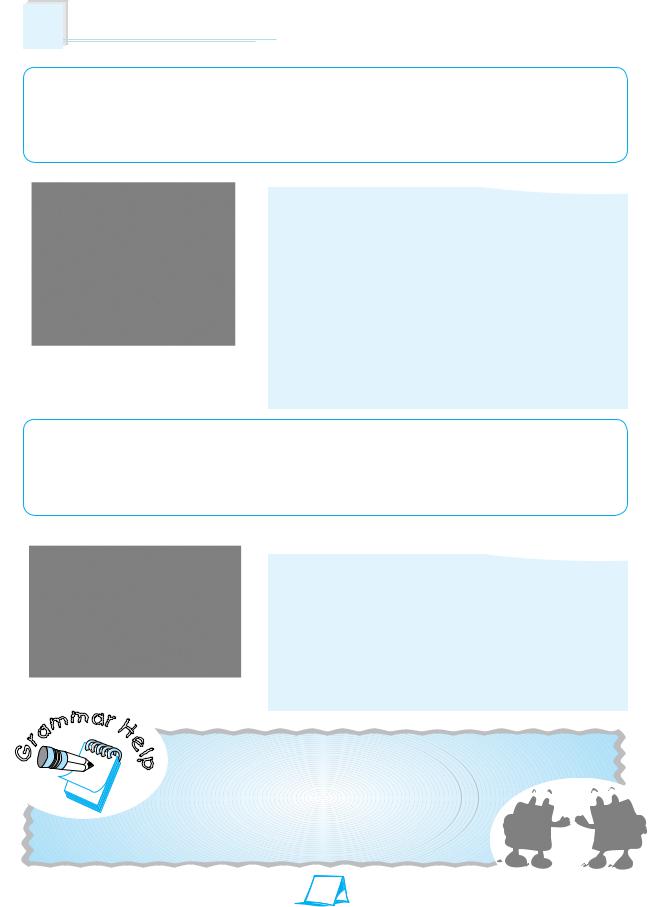
The Imperative
Use the base form of a verb to give commands or make direct requests. This use of the verb is called the imperative.
OK, children, open your books to page 25.
Stand, everyone!
Tidy your bedroom immediately! Choose a partner!
Eat plenty of vegetables.
Find some nice round pebbles. Come back soon!
Take a sandwich.
Come and look at this, Tom!
Imperatives are a very direct way of telling people to do something. Using do or please before an imperative is more polite.
G
|
|
|
|
|
|
|
Do sit down. |
|
|
|
|
|
|
|
|
|
Do check these figures again. |
|
|
|
|
|
|
|
|
|
Please help yourselves to some food. |
||
|
|
Please come in. |
Please don’t change anything on |
|
|||||
|
|
my computer. |
|
|
|||||
|
|
|
m |
a |
|
|
|
|
|
|
|
|
|
|
|
|
|
||
|
m |
r |
H |
|
|
|
|
||
|
|
|
|
|
|
||||
a |
|
|
|
|
|
|
|
||
r |
|
|
|
|
e |
You can also use the helping verb would to |
|
||
|
|
|
|
|
l |
|
|||
|
|
|
|
|
p |
sound polite. For example: |
|
|
|
|
|
|
|
|
|
|
|
||
|
|
|
|
|
|
Please would you clear the table? |
|
|
|
|
|
|
|
|
|
Would you please talk quietly? |
Please |
Would |
|
|
|
|
|
|
|
|
|
||
141
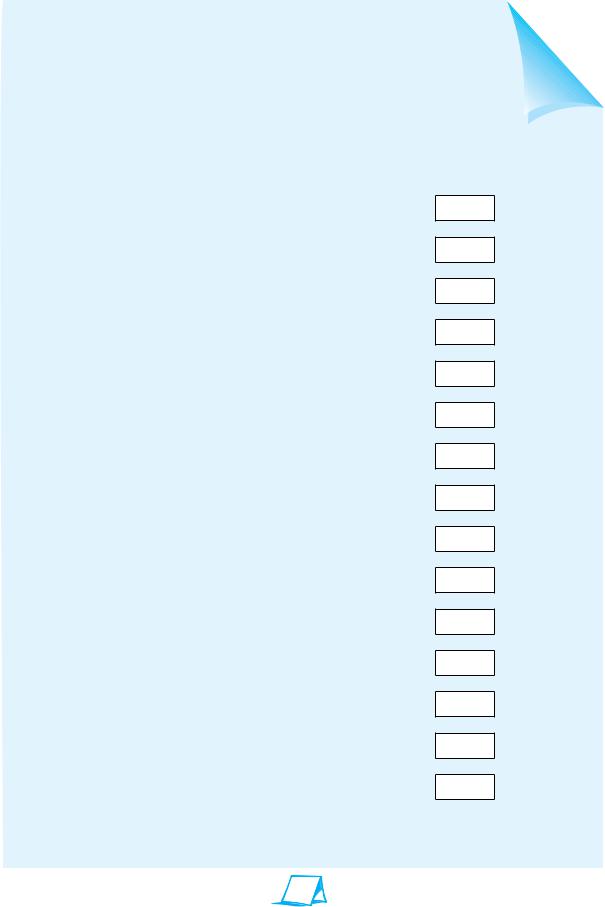
Exercise
Look at the groups of words below. Do you know which are sentences and which are not?
Put a checkmark in the space next to sentences, and an X next to other word groups.
1 Mrs. Chen is a good teacher.
2 not well today
3 Do the work yourself.
4 How are you?
5 basic rules of grammar
6 bread and butter
7 Welcome to the National Zoo.
8 brush his teeth
9 toys in the box
10 more than one
11 What is the time now?
12 Sit down!
13 Please come here.
14 Mark is sleeping.
15 Open the door.
142
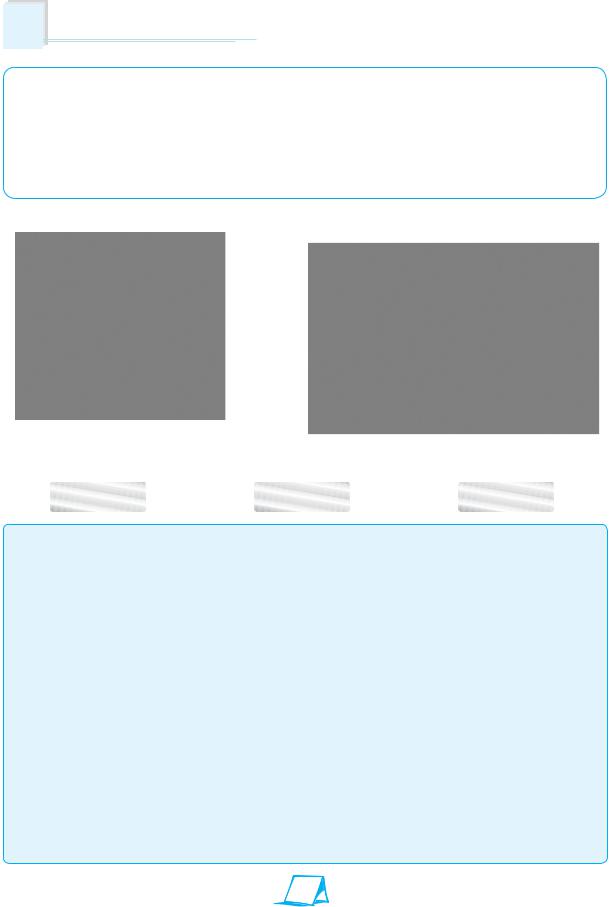
The Subject and the Object
The subject of a sentence sometimes does something to someone or something else.
The person or thing that receives the action is called the object.
Dad is cooking supper. |
We have built a sandcastle. |
||||
Subject |
|
|
Verb |
|
Object |
Susan |
|
has bought |
|
a painting. |
|
|
|
||||
Hannah |
|
is reading |
|
her book. |
|
The twins |
|
|
climbed |
|
the hill. |
James |
|
|
stroked |
|
the cat. |
Mom |
|
|
is holding |
|
the baby. |
Jacob |
|
|
is making |
|
a kite. |
They |
|
were playing |
|
football. |
|
I |
|
am writing |
|
a story. |
|
Emma |
|
|
crossed |
|
the street. |
You |
|
have forgotten |
|
your umbrella. |
|
|
|
|
|
|
|
143
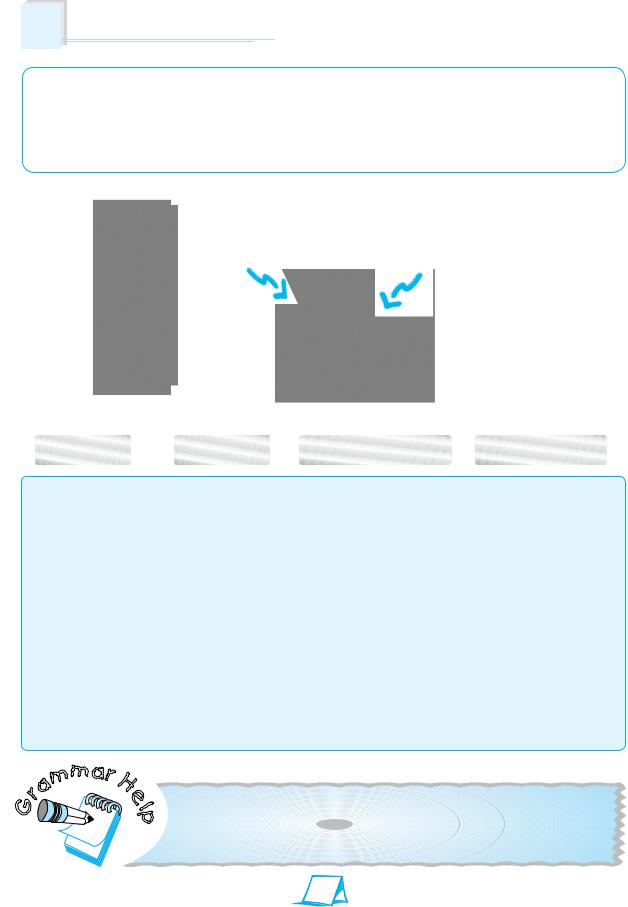
Direct and Indirect Objects
Some verbs have two objects. The direct object receives the action of the verb. The indirect object tells to whom or for whom the action is done.
indirect |
|
|
|
direct |
|
object |
|
|
|
object |
|
|
|
|
|
|
|
Dad bought
James a bike.
Subject |
|
Verb |
|
Indirect Object |
|
Direct Object |
The bank |
|
lends |
|
people |
|
money. |
|
|
|
||||
Madison |
|
is making |
|
her doll |
|
a dress. |
I |
|
am writing |
|
Grandma |
|
a letter. |
Grandma |
|
is reading |
|
Diana |
|
a story. |
Andrew |
|
gave |
|
his dog |
|
a bone. |
We |
|
left |
|
you |
|
some food. |
Joshua |
|
is showing |
|
us |
|
his stamps. |
Miss Lee |
|
found |
|
Alice |
|
a chair. |
|
|
|
|
|
|
|
G
|
m |
a |
|
r |
|
m
ar
H e
l p
The indirect object usually comes before the direct object. 
144

Exercise 1
Read the following sentences. Then draw a line under the subjects and a circle around the objects.
1Anne has drawn a panda.
2They are playing table tennis.
3Little Kate knows the alphabet well.
4Dad bought a computer.
5I am writing a letter.
6Birds have feathers.
7The workmen are building a house.
8Samantha has a pretty doll.
9The children received one gift each. 10 Do you know the answer?
Exercise 2
There are two objects in each sentence. Draw a line under the direct objects and a circle around the indirect objects.
1Dad gave Dave a present.
2Mom is making the children a meal.
3Mr. Thomas bought them ice cream cones.
4I sent Anne a birthday card.
5Granny told us a story.
6The waiter brought the guests their drinks.
7Can I get you a sandwich?
8The police officer showed us the way to the museum.
145
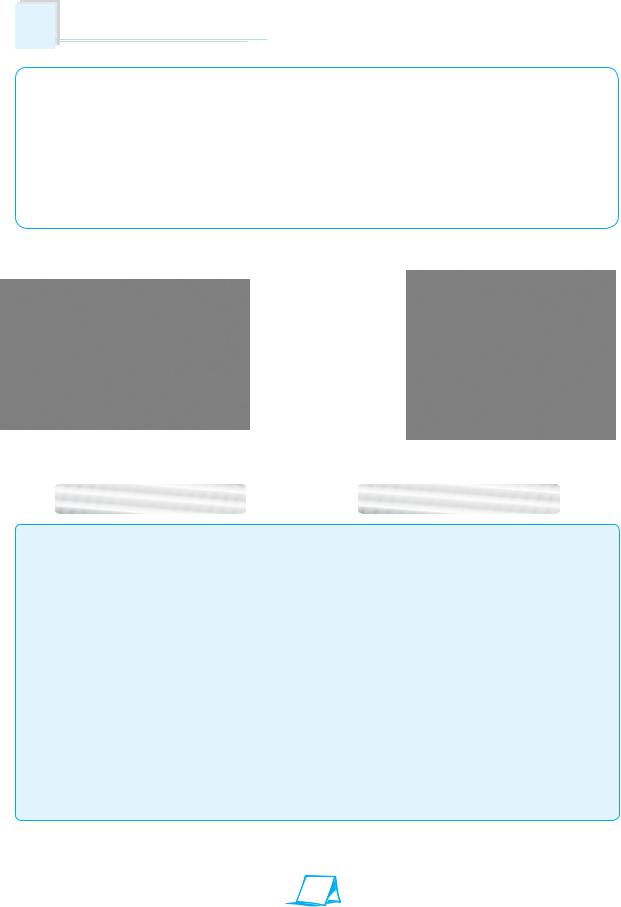
Positive and Negative Sentences
A positive sentence tells you that something is so.
A sentence that tells you something is not so is called a negative sentence. It contains a negative word like not, never, no, no one, nobody, none, or a negative verb like isn’t or can’t or won’t.
Yes |
No |
|
Positive sentence |
|
Negative sentence |
Peter is running. |
|
He is not walking. |
|
||
We should tell the truth. |
|
We should never tell lies. |
Everyone is in the garden. |
|
There is no one in the house. |
The fridge is empty. |
|
There is nothing in it. |
It is very cloudy. |
|
It isn’t sunny. |
I have sold the last |
|
I have no newspapers left. |
newspaper. |
|
|
Someone has eaten |
|
There are none in the bag. |
all the cookies. |
|
|
|
|
|
146
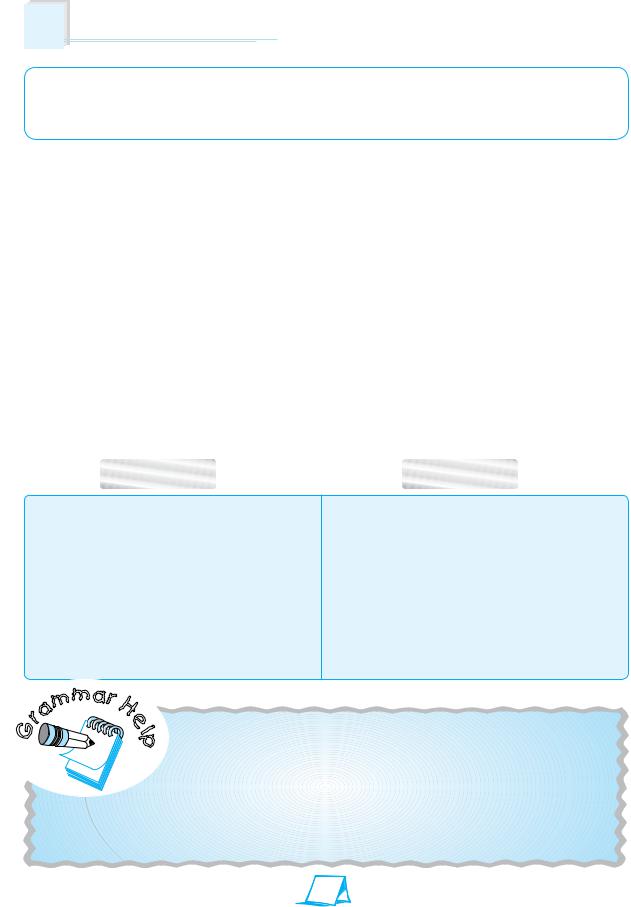
Questions
There are two kinds of questions: yes or no questions and wh- questions.
4You ask a yes or no question to get yes or no as the answer. Use the verbs be, have or do, or any of the helping verbs, to ask yes or no questions.
Can you swim? Yes. |
|
Are they coming? No. |
Is it raining? No. |
|
May I come in? Yes. |
|
|
|
4In questions, the helping or auxiliary verbs come before the subject of the sentence. When be and have
are used as ordinary verbs, they come before the subjects, too.
Statement |
Question |
G
Jim is ill today.
She has an older brother The cats want to be fed. We should go now.
It will rain tomorrow.
You may use my computer. Kate can ride a bike.
Is Jim ill today?
Has she an older brother? Do the cats want to be fed?
Should we go now?
Will it rain tomorrow? May I use your computer? Can Kate ride a bike?
|
|
a |
|
|
|
|
m |
|
|
|
m |
r |
H |
|
a |
|
|
||
r |
|
|
e |
Here are some different ways of asking the |
|
|
|
l |
|
|
|
|
p |
same question: |
|
|
|
|
|
Has he a sister called Jane?
Does he have a sister called Jane?
Has he got a sister called Jane?
147
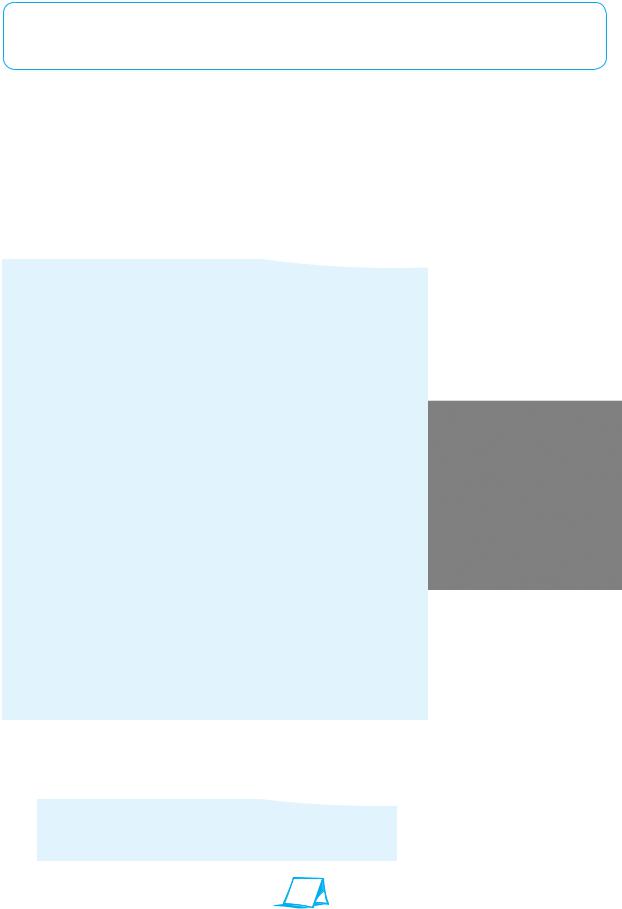
Wh- questions usually include the verbs be, have, do, or any of the helping verbs.
4To ask for facts, use the question words what, which, who, whom, how, when, where. The helping verbs in wh- questions usually come before the subject. So does the verb be when it is used as an ordinary verb.
Where are you? What is David saying?
How did you get up here? Why was the girl crying? Which color do you prefer?
Who is she going to invite to her party? Whom is she going to invite to her party? What is your problem?
When do the stores open in the morning? Where shall I put this box?
What have you done to my computer? How am I going to finish all this work? What would you like for dinner?
Whose dictionary is this?
4If the wh- question word is the subject of the question, it comes before the verb. For example:
Who told you that?
What made you change your mind?
148

Exercise 1
Write short answers to the following questions.
Example: Is he tall? Yes, he is.
1 Do you know the answer? Yes, ___________.
2 Is Sara at home? |
No, ___________. |
3Do they know any grammar? Yes, ___________.
4Are all of you coming to my house this evening? Yes, ___________.
5 Is Mrs. Chen your English teacher? No, __________. 6 Can you dance? No, ___________.
Exercise 2
Fill in the blanks with the correct question words from the box.
where |
when |
why |
how |
whose |
what |
who |
which |
1________ is your house?
2________ wallet is this?
3________ are you always late?
4________ wrote this book?
5________ of the two boys is smarter?
6________ size do you wear?
7________ old is he?
8________ is Jeff going to get a haircut?
149
